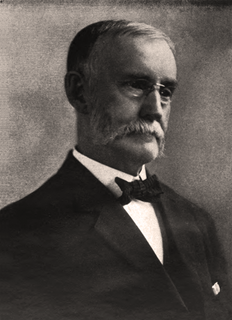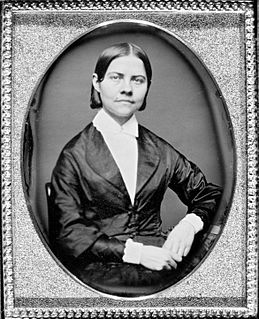A Quote by J.R. Miller
A woman whose heart is not touched by the sickness of sorrow and whose hands do not go out in relief where it is in her power to help, lacks one of the elements which make the glory of womanhood.
Related Quotes
Women are in bondage; their clothes are a great hindrance to their engaging in any business which will make them pecuniarily independent, and since the soul of womanhood never can be queenly and noble so long as it must beg bread for its body, is it not better, even at the expense of a vast deal of annoyance, that they whose lives deserve respect and are greater than their garments should give an example by which woman may more easily work out her own emancipation?
There is emotion in the hug, and there is respect and a form of love. Emotion that comes from honesty, respect that comes from challenge, and the form of love that exists between people whose minds have touched, whose hearts have touched, whose souls have touched. Our minds touched. Our hearts touched. Our souls touched. We separate.
I think Nature, if she interests herself much about her children, must often feel that, like the miserable Frankenstein, with her experimenting among the elements of humanity, she has brought beings into existence who have no business here; who can do none of her work, and endure none of her favours; whose life is only suffering; and whose action is one long protest against the ill foresight which flung them into consciousness.
Friends now fast sworn,
Whose double bosoms seems to wear one heart,
Whose hours, whose bed, whose meal and exercise
Are still together, who twin, as 'twere, in love,
Unseparable, shall within this hour,
On a dissension of a doit, break out
To bitterest enmity; so fellest foes,
Whose passions and whose plots have broke their sleep
To take the one the other, by some chance,
Some trick not worth an egg, shall grow dear friends
And interjoin their issues.
It is as great a crime to leave a woman alone in her agony and deny her relief from her suffering as it is to insist upon dulling the consciousness of a natural mother who desires above all things to be aware of the final reward of her efforts, whose ambition is to be present, in full possession of her senses, when the infant she already adores greets her with its first loud cry and the soft touch of its restless body upon her limbs.
On this question of principle, while actual suffering was yet afar off, they [the Colonies] raised their flag against a power to which, for purposes of foreign conquest and subjugation, Rome in the height of her glory is not to be compared,-a power which has dotted over the surface of the whole globe with her possessions and military posts, whose morning drum-beat, following the sun, and keeping company with the hours, circles the earth with one continuous and unbroken strain of the martial airs of England.
Works of imagination excel by their allurement and delight; by their power of attracting and detaining the attention. That book is good in vain which the reader throws away. He only is the master who keeps the mind in pleasing captivity; whose pages are perused with eagerness, and in hope of new pleasure are perused again; and whose conclusion is perceived with an eye of sorrow, such as the traveller casts upon departing day.
Such is the effect of the grace of God in the heart of a pilgrim; while on one hand he sees the propensity of his evil nature to every sin which has been committed by others, and is humbled; he also confesses, that, by no power of his own, is he preserved, but ever gives the glory to the God of all grace, by whose power alone he is kept from falling.



































